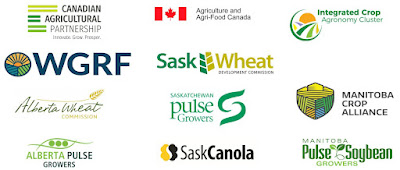Introduction
Each growing season Prairie field crop producers are faced with multiple abiotic and biotic issues. Of the biotic issues plant diseases can have a critical impact on crop productivity and grain quality. For some issues prior knowledge of disease history and impact can be used to modify cropping plans to minimize the impact of these issues in future growing seasons. These plans can include strategies such as extending the rotational interval between host crops, choosing a more resistant variety, and using good agronomics to promote overall plant health.
Unfortunately for some plant disease issues, management decisions need to be made during the growing season and these typically involve the decision to apply a fungicide. For some issues such as sclerotinia stem rot in canola and fusarium head blight in small grain cereals, the decision to spray or not to spray comes too late if symptoms in the crop are already apparent. In contrast, for cereal leaf spots and rusts, and foliar pulse crop diseases a producer or crop consultant can follow their development to gauge risk and the need for an initial and subsequent fungicide applications.
The growing season is extremely busy for producers and crop consultants and thus awareness of developing issues on a regional- or prairie-wide basis is critical as one can then prioritize the scouting of fields for specific issues that are just starting to develop.
To help facilitate awareness of developing plant disease issues on a regional- and prairie-wide basis, the PCDMN and the three Prairie provincial pathologists have worked with colleagues from the AAFC Geomatics Group. The result of this collaboration is the development and deployment of the Prairie Crop Disease Monitoring Network Quick Disease Reporter Tool (PCDMN QDRT). The PCDMN QDRT was initially launched in June 2021, and is now again available for summer 2022!
The PCDMN QDRT can be used to make quick general reports of diseases in common crops over the Prairie region as part of the Prairie Crop Disease Management Network. This information can be used to identify regions where Prairie crop disease outbreaks are starting to occur and where further in-crop scouting and risk assessment are needed, especially when a fungicide application is being considered.
Please note that if you are reporting on the observation of clubroot symptoms in Saskatchewan canola fields you are asked to also report the case to the Saskatchewan Ministry of Agriculture using the information outlined via this link: https://publications.saskatchewan.ca/api/v1/products/106547/formats/119190/download.
If you have any questions or would like to learn more about the PCDMN please visit: https://prairiecropdisease.blogspot.com/.
More information on disease identification, scouting tips and disease surveillance protocols can be found at: https://prairiecropdisease.blogspot.com/p/scouting-tips-calendar.html and https://prairiecropdisease.blogspot.com/p/surveillance-protocols.html.
More information on disease identification, scouting tips and disease surveillance protocols can be found at: https://prairiecropdisease.blogspot.com/p/scouting-tips-calendar.html and https://prairiecropdisease.blogspot.com/p/surveillance-protocols.html.
Contact info regarding the PCDMN and Provincial Pathologists is as follows
PCDMN – T. Kelly Turkington: kelly.turkington@agr.gc.ca;
Alberta Agriculture and Forestry – Michael Harding: Michael.Harding@gov.ab.ca
Saskatchewan Ministry of Agriculture – Alireza Akhavan: alireza.akhavan@gov.sk.ca
Manitoba Agriculture, Food and Rural Initiatives – David Kaminski: David.Kaminski@gov.mb.ca.
On June 1, 2022 we launched the updated Prairie Crop Disease Monitoring Network Quick Disease Reporter Tool (PCDMN QDRT) for the 2022 growing season (https://prairiecropdisease.blogspot.com/2022/06/announcing-2022-launch-of-prairie-crop.html).
This blog post and others regarding the PCDMN QDRT in 2021 and 2022 are now outdated as various updates have been done with the app as of May 2023. These updates have been focused on addressing privacy concerns from farmers, crop consultants and others who may use the app as well as functionality. The new tutorial can be found at this link (https://prairiecropdisease.blogspot.com/2023/05/prairie-crop-disease-monitoring-network.html), while the new QR code for the PCDMN QDRT app is as follows:
Acknowledgements
The Prairie Crop Disease Monitoring Network (PCDMN) would like to thank the Canadian Agricultural Partnership Integrated Crop Agronomy Cluster and associated funding bodies for their gracious financial support.
The PCDMN would also like to sincerely thank Matthew McBurney, Geomatics Specialist, and Ryan Tondevold, Head – Geospatial Data Management, Science and Technology Branch, Agriculture and Agri-Food Canada, for their gracious assistance regarding the development and implementation of the PCDMN QDRT.



